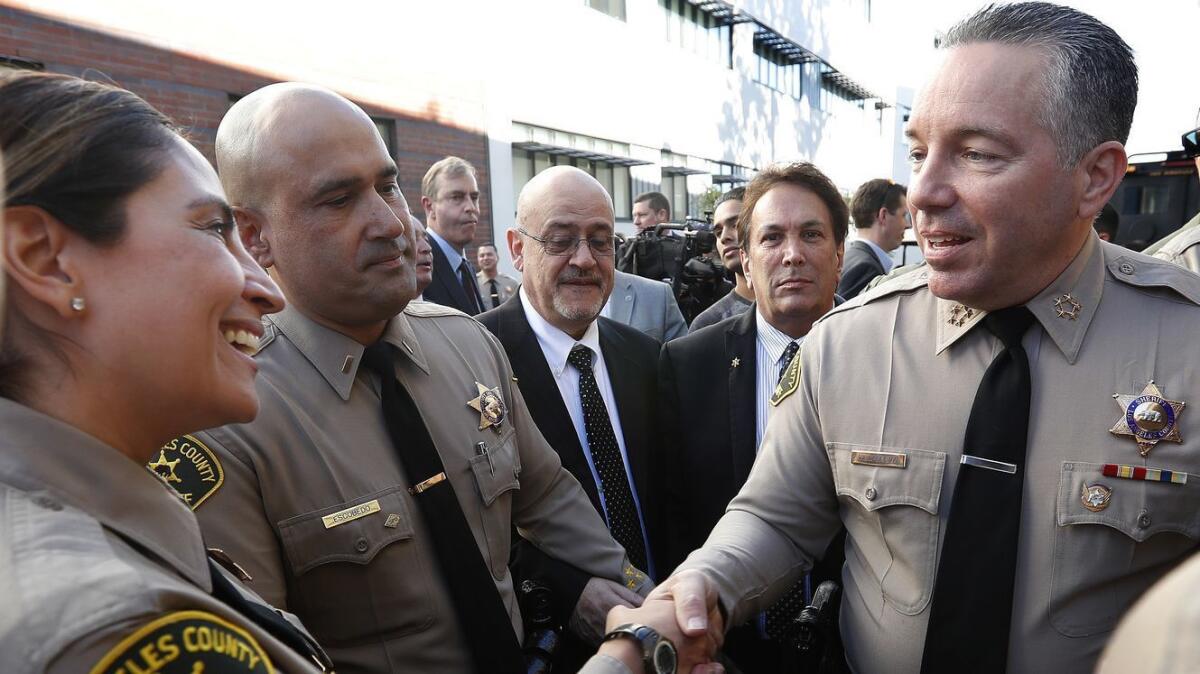Column: The new L.A. County sheriff is off to a bumpy start. Makes you wonder why we appoint police chiefs but elect sheriffs

- Share via
In 1998, Los Angeles County Sheriff Sherman Block took a fall in his bathtub, suffered a brain hemorrhage and died.
But his supporters so detested his reelection challenger, Lee Baca, they kept Block’s campaign alive after his death.
The candidate with a pulse prevailed, but 703,178 L.A. County residents cast ballots for the entombed candidate.
I’m telling you this for the sake of context. If a dead man could get nearly three-quarters of a million votes, perhaps it’s less shocking that last November, retired sheriff’s Lt. Alex Villanueva was elected sheriff of L.A. County.
Villanueva beat one-term Sheriff Jim McDonnell, who was not perfect, but was more of a reformer than anyone who’s worn that uniform in a while. McDonnell’s predecessor Baca, for those who’ve forgotten, is free while appealing his conviction for conspiracy, obstruction of justice and lying related to scandalous levels of corruption and mismanagement on his watch.
Villanueva, now on the job for just a matter of weeks, has wasted no time raising questions about his own competence and desire to move the department out of the shadows. On Tuesday morning I watched as the county Board of Supervisors laid into him for boldly and defiantly reinstating a deputy who had been fired over allegations of domestic abuse.
I’ll get to the specifics in a minute, but let me first note that close observers were already flinching during the campaign, when Villanueva criticized reforms instituted by McDonnell.
Rather than sticking up for the people of L.A. County, Villanueva stuck up for deputies he said were being treated unfairly, despite the department’s culture of violence against jail inmates. He spoke out against requirements for reporting minor uses of force. He wanted to bring back metal flashlights despite concerns about their misuse. And he smacked McDonnell’s attempt to give prosecutors the names on a secret list of deputies with histories of discipline for dishonesty and misconduct.
So we can’t be entirely surprised that one of Villanueva’s first acts as sheriff was the reinstatement of a deputy who played a key role in his campaign after being fired by McDonnell. The deputy, Caren Carl Mandoyan, had been accused by a female deputy of a physical assault in 2015. She said he grabbed her neck, pushed her face into a couch, tried to break into her home and harassed her in text messages.
Prosecutors declined to charge Mandoyan, citing insufficient evidence, but a county appeals board upheld the deputy’s firing.
It was a bit of a surprise to county officials that Villanueva chose to appear at Tuesday’s board meeting, knowing the supervisors were about to vote on a request for him to reconsider the deputy’s reinstatement. They also intended to ask county lawyers whether Villanueva could legally override the appeals board that upheld the deputy’s firing.
As I sat in the audience, I wondered if the sheriff was there to announce that after carefully considering the flood of criticism, he had decided he’d rather begin his reign on a more positive, less divisive note, and so he was rescinding his reinstatement of the deputy.
Not a chance. Instead, Villanueva doubled down.
He claimed the L.A. Times misrepresented him in stories but didn’t explain what he meant by that. He suggested the civil service system is weighted against deputies but didn’t make a convincing argument. And he began his comments with a tortured reference to presumptions of vulnerability and innocence. I couldn’t make heads or tails of what he was saying, and, looking around the room, I didn’t appear to be alone.
Villanueva also referred to a mysterious sounding in-house “truth and reconciliation” commission that’s going to help him truly reform the department, and pardon me for just a sliver of doubt.
Supervisors Kathryn Barger and Sheila Kuehl were flabbergasted, not just by the reinstatement of a man fired for alleged domestic abuse, but by Villanueva’s snubbing of the established disciplinary review process.
“None of us is so independent that we can do anything we damn well please,” Kuehl told Villanueva.
Villanueva insisted the supervisors would understand his decision to reinstate the deputy when they heard the details of the case in closed session, and he said the deputy would get back pay dating to his firing in 2016.
It’s not clear what details Villanueva was referring to, but even if there are doubts about the deputy’s conduct, there’s no doubt the new sheriff came off like a knuckle-dragging troglodyte last week when he appeared before the Sheriff Civilian Oversight Commission. Villanueva defended his reinstatement of the fired deputy there, too, arguing that his accuser waited nearly a year to report her claims of abuse and quit the department before she was about to testify.
“Those are big warning signs about the credibility of the [complaint],” Villanueva said, as reported by my colleague Maya Lau.
What I’m getting is a big warning sign that Villanueva has been hibernating the last few years and woke up without a clue about the #MeToo revelations that taught most of us something about the dynamics of abuse, power, control, intimidation and fear.
Could the county’s top cop be any more tone deaf or send a worse message to civilian victims of abuse who fear the risks of coming forward?
Lau also reported that Villanueva said the discipline of deputies accused of domestic violence should not proceed in the absence of criminal charges, and that only abuse connected to employment should be cause for disciplinary action.
So how did a guy like this get elected?
Because McDonnell didn’t run a very good campaign despite raising much more money. Because deputies had Villanueva’s back and the union pumped $1.3 million into his campaign. Because Villanueva speaks Spanish in a county with a huge Latino population and said he’d boot ICE out of the jails.
And because in California, voters were in a mood to dump Republicans. Even though the office of sheriff is nonpartisan and McDonnell is an independent, Villanueva’s backers had a winning strategy.
“Where did Democrats in L.A. County have to go to express their displeasure with Trump?” asked one Villanueva strategist. “All we had to do was make McDonnell a Republican and Villanueva a Democrat.”
So why do we and virtually every other county in the country elect sheriffs, but we appoint chiefs of police, not that either system guarantees winners every time?
Because it’s always been that way, and it would require a state constitutional amendment if we wanted to appoint sheriffs in California. And that’s unlikely to happen, said Bob Stern, a longtime local and state government watchdog.
“Voters would say no, they want to elect sheriffs,” said Stern. “They love to have an opportunity to elect, and then when they go to the polls they complain about all the issues they have to vote on.”
Because the sheriff is elected, the L.A. County Board of Supervisors has little control over Villanueva, They can jam him on budget matters, but they wouldn’t do that at the peril of public safety.
Villanueva does, however, sooner or later, have to answer to all of us.
Get more of Steve Lopez’s work and follow him on Twitter @LATstevelopez
More to Read
Sign up for Essential California
The most important California stories and recommendations in your inbox every morning.
You may occasionally receive promotional content from the Los Angeles Times.










